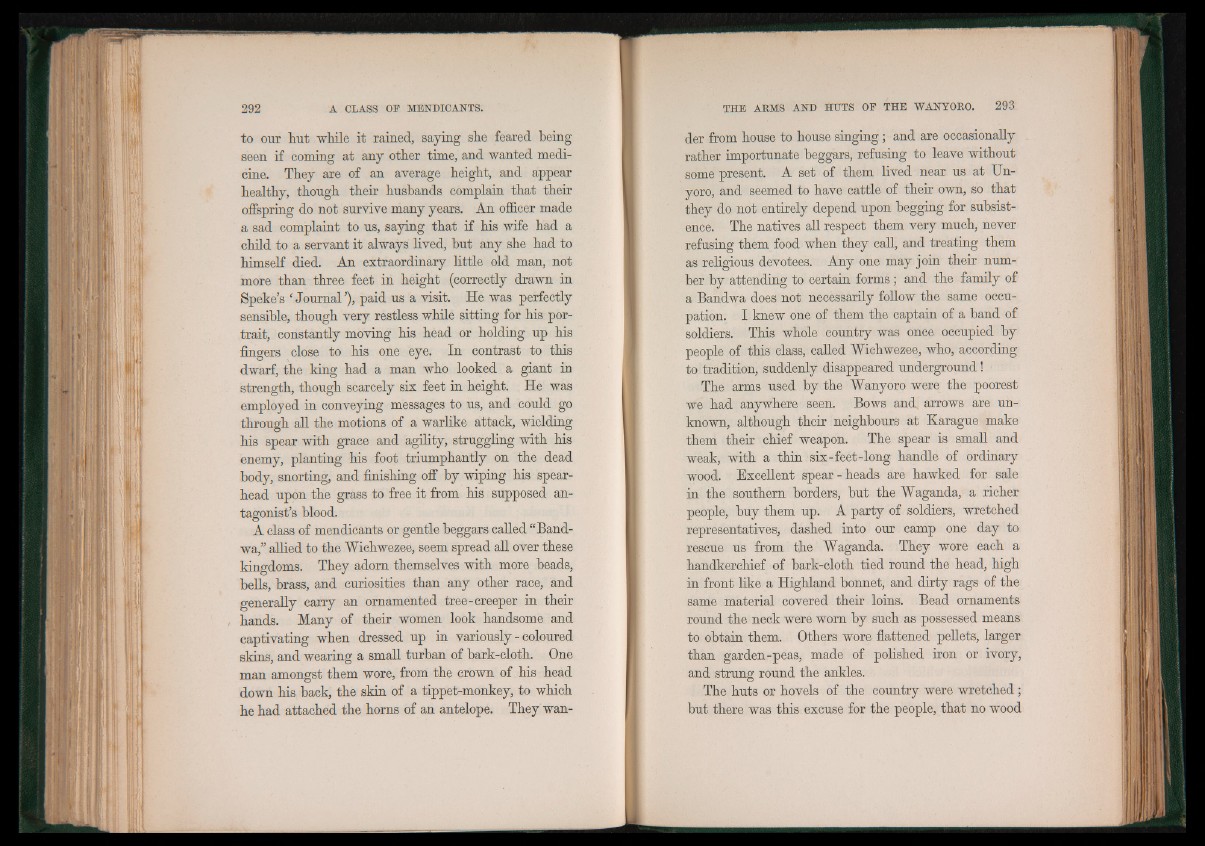
to our hut while it rained, saying she feared being
seen if coming at any other time, and wanted medicine.
They are of an average height, and appear
healthy, though their husbands complain that their
offspring do not survive many years. An officer made
a sad complaint to us, saying that if his wife had a
child to a servant it always lived, but any she had to
himself died. An extraordinary little old man, not
more than three feet in height (correctly drawn in
Speke’s ‘Journal’), paid us a visit. He was perfectly
sensible, though very restless while sitting for his portrait,
constantly moving his head or holding up his
fingers close to his one eye. In contrast to this
dwarf, the king had a man who looked a giant in
strength, though scarcely six feet in height. He was
employed in conveying messages to us, and could go
through all the motions of a warlike attack, wielding
his spear with grace and agility, struggling with his
enemy, planting his foot triumphantly on the dead
body, snorting, and finishing off by wiping his spearhead
upon the grass to free it from his supposed antagonist’s
blood.
A olaas of mendicants or gentle beggars called “Band-
wa,” allied to the Wiehwezee, seem spread all over these
kingdoms. They adorn themselves with more beads,
bells, brass, and curiosities than any other race, and
generally carry an ornamented tree-creeper in their
hands. Many of their women look handsome and
captivating when dressed up in variously - coloured
skins, and wearing a small turban of bark-cloth. One
rna.n amongst them wore, from the crown of his head
down his back, the skin of a tippet-monkey, to which
he had attached the horns of an antelope. They wander
from house to house singing; and are occasionally
rather importunate beggars, refusing to leave without
some present. A set of them lived near us at Un-
yoro, and seemed to have cattle of their own, so that
they do not entirely depend upon begging for subsistence.
The natives all respect them very much, never
refusing them food when they call, and treating them
as religious devotees. Any one may join their number
by attending to certain forms; and the family of
a Bandwa does not necessarily follow the same occupation.
I knew one of them the captain of a band of
soldiers. This whole country was once occupied by
people of this class, called Wiehwezee, who, according
to tradition, suddenly disappeared underground!
The arms used by the Wanyoro were the poorest
we had anywhere seen. Bows and, arrows are unknown,
although their neighbours at Karague make
them their chief weapon. The spear is small and
weak, with a thin six-feet-long handle of ordinary
wood. Excellent spear-heads are hawked for sale
in the southern borders, but the Waganda, a richer
people, buy them up. A party of soldiers, wretched
representatives, dashed into our camp one day to
rescue us from the Waganda. They wore each a
handkerchief of bark-cloth tied round the head, high
in front like a Highland bonnet, and dirty rags of the
same material covered their loins. Bead ornaments
round the neck were worn by such as possessed means
to obtain them. Others wore flattened pellets, larger
than garden-peas, made of polished iron or ivory,
and strung round the ankles.
The huts or hovels of the country were wretched;
but there was this excuse for the people, that no wood